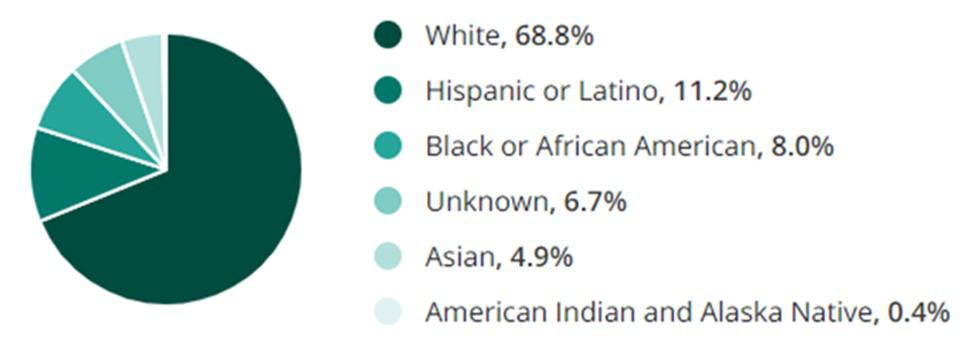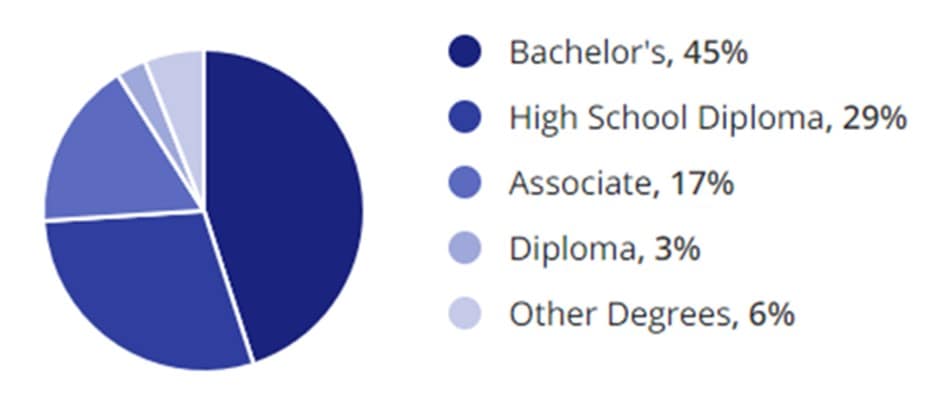Embarking on your professional journey can be both exhilarating and daunting. The world of work is vast and varied, offering endless opportunities for growth and exploration. For recent graduates or those transitioning into a new career path, entry-level jobs serve as the gateway to the professional world. These positions lay the groundwork for a successful career, offering invaluable experience, skill development, and professional networking opportunities.
In this ultimate guide, we dive deep into entry-level jobs. Whether you’re interested in entry-level human resources, finance, transportation, or education jobs, we cover everything you need to know to start your career on the right foot. From educational requirements to skills in demand, current hiring trends, and future job outlooks, this guide is your comprehensive resource for beginning your professional journey.
Diversity in entry-level jobs is not just beneficial—it’s essential. It brings fresh perspectives, fosters innovation, and drives growth within organizations. As we delve into the specifics of entry-level positions, remember the importance of inclusive workplaces that value and nurture talent from all walks of life.
Are you ready to discover the opportunities that await you? Let’s embark on this journey together and unlock the door to your future. Welcome to your ultimate guide to finding your dream entry-level job.
Educational Requirements
Starting your journey in the job market? Entry-level jobs open doors to vast opportunities. A high school diploma is the base requirement for most entry-level positions. Yet, a bachelor’s degree often becomes essential as you eye roles with more responsibility or specialized fields, such as entry-level human resources jobs.
Educational demands vary greatly across industries. For instance, entry-level finance jobs usually require a degree in finance, economics, or a related field. Similarly, entry-level HR jobs might prefer a background in human resources, psychology, or business administration.
Beyond degrees, certifications and internships can set you apart. They bolster your resume and demonstrate your commitment and practical skills to potential employers. For specific sectors, like tech, certifications in software, programming languages, or analytics tools can be particularly advantageous.
Remember, the right blend of education and practical experience can significantly enhance your appeal to hiring managers in the diverse landscape of entry-level jobs.
Areas of Expertise
Entry-level jobs span a variety of fields, each with its own set of specialties. Knowing where your interests and skills align can help you find a fulfilling career path right from the start.
Business and Administration
For those intrigued by the mechanics of businesses, roles in sales, marketing, and administration offer a solid foundation. These positions provide insight into how organizations operate and succeed.
Technology and IT
The tech world is brimming with opportunities for those with a knack for solving problems using technology. IT support, software development, and data analysis positions are ideal for those eager to dive into the digital era.
Healthcare
Entry-level Nursing, medical assisting, and healthcare administration jobs are crucial with an ever-growing demand for healthcare services. These roles offer stability and the chance to make a meaningful impact on people’s lives.
Engineering and Manufacturing
Engineering offers a range of specialties for those driven by the desire to build and innovate. From civil to software engineering, these roles are foundational to the development of new technologies and structures.
Each area of expertise presents unique entry points into the workforce. Whether your passion lies in entry-level engineering jobs or entry-level manufacturing jobs, there’s a place for you to start your career journey and grow.
Demographics in the United States
Ethnicity/Race:
The landscape of entry-level jobs in the U.S. is as diverse as the country. The workforce is composed of individuals from various ethnic and racial backgrounds, reflecting our multicultural society. The breakdown is roughly as follows:
- White: 68.8%
- Hispanic or Latino: 11.2%
- Black or African American: 8%
- Asian: 4.9%
- Unknown: 6.7%
- Native American and Alaska Native: 0.4%

Gender:
Entry-level positions see a nearly balanced representation of genders, with a slight tilt towards males. The distribution is approximate:
- Male: 66.2%
- Female: 33.8%
Efforts continue across industries to create equal opportunities for all genders, aiming for a more balanced workforce.

Age:
Younger individuals, typically around 23, predominantly fill entry-level roles. This group mainly comprises recent college graduates or those making early career shifts. Their fresh perspectives and energy are valuable assets in any industry.
Understanding entry-level job demographics is crucial for job seekers and employers. It sheds light on the diversity of the workforce and the importance of inclusive hiring practices. With initiatives aimed at balancing the scales in terms of ethnicity, gender, and age, the goal is to create a workforce that truly represents the society in which we live.

Salary Trends
As entry-level professionals embark on their career journeys, salary is a critical factor to consider. The earnings for entry-level roles vary depending on the industry, location, and job duties. On average, entry-level U.S. positions offer salaries ranging from $30,000 to $50,000 annually.
Those venturing into the biotech or science sector might find that the starting salaries are on the higher end of the spectrum due to the specialized skills required. Similarly, tech industries, known for their competitive pay, offer higher starting salaries for software development or data analysis roles.
It’s important to note that these figures can fluctuate greatly based on your geographic location, with urban areas often offering higher wages to account for the cost of living. Additionally, unique skills, certifications, or internships related to your field can positively impact your starting salary.
Here are a few key points to remember about salary trends in entry-level jobs:
- Average salaries range from $30,000 to $50,000 per annum.
- Specialized fields like finance and technology may offer higher starting salaries.
- Geographic location significantly influences earning potential.
- Additional skills and certifications can boost your initial salary offer.
While salary is essential to your job search, consider job satisfaction, growth potential, and company culture. A well-rounded job offer that aligns with your career goals and values can often outweigh a slightly higher salary elsewhere.
Hiring Trends
Understanding entry-level job hiring trends is crucial for job seekers and employers navigating the ever-evolving job market. Currently, the demand for fresh talent remains strong across various industries. Organizations recognize the value of nurturing new hires who bring innovative ideas and energy to the team.
Growth Areas
Technology and healthcare are two sectors experiencing significant growth, creating a surge in demand for entry-level positions. The tech industry, in particular, is looking for candidates with digital skills as businesses continue to embrace digital transformation. Healthcare, on the other hand, sees a steady need for support roles due to an aging population and the ongoing global health focus.
Remote Work and Flexibility
Another trend shaping the hiring landscape is the rising preference for remote work and flexible scheduling. Many entry-level roles offer remote work options, especially in IT and digital marketing. This flexibility can attract a more diverse pool of candidates and cater to the needs of the modern workforce.
Emphasis on Soft Skills
Soft skills like communication, teamwork, and adaptability are increasingly in demand, regardless of the job sector. Employers value individuals who can effectively collaborate and adapt to rapid changes. Highlighting these skills during your job search can enhance your employability.
Key hiring trends include:
- Strong demand in technology and healthcare sectors.
- Rising preference for remote work and flexible schedules.
- Increased emphasis on soft skills alongside technical abilities.
Staying informed about these trends can help job seekers better prepare for the job market and aid employers in attracting the right talent. As the landscape of entry-level jobs continues to evolve, adaptability and a proactive approach to skill development remain key.
Education Levels
The world of entry-level jobs is varied, and so are the education levels employers look for when hiring. Understanding these requirements is critical to positioning yourself effectively in the job market.
High School Diploma or Equivalent
A high school diploma or equivalent is the minimum requirement for many entry-level positions. These roles offer a chance to enter the workforce and gain experience in industries such as retail, customer service, and some administrative roles.
Associate Degree
An associate degree can open doors to more specialized positions, particularly in technical fields like information technology, healthcare, and certain types of engineering and manufacturing roles. Such qualifications signal to employers a higher level of skill and training.
Bachelor’s Degree
A bachelor’s degree is often considered the standard for many entry-level jobs, especially in business, finance, engineering, and technology. Employers view this level of education as indicative of a candidate’s depth of knowledge and readiness for professional environments.
Postgraduate Education
While less common for entry-level positions, some specialized roles, particularly in research, healthcare, or high-tech, may require or prefer candidates with postgraduate education. Such qualifications can significantly enhance employability in niche fields.
Key education levels include:
- High School Diploma or Equivalent
- Associate Degree
- Bachelor’s Degree
- Postgraduate Education
As you embark on your job search, aligning your education with the roles you’re applying for is important. Tailoring your applications to show how your educational background makes you the perfect fit can help you stand out in a crowded job market.

Skills in Demand
In the competitive landscape of entry-level jobs, standing out to potential employers means showcasing the right skills. Let’s explore the hard and soft skills currently in high demand across various industries.
Hard Skills
- Technical Proficiency: In the digital age, familiarity with essential software tools, coding languages, and technology platforms is highly prized, especially for entry-level IT and tech roles.
- Data Analysis: The ability to interpret data and provide actionable insights is crucial in many sectors, including business, finance, and healthcare.
- Digital Marketing: Skills like SEO, content creation, and social media management are sought after in the evolving marketing landscape.
Soft Skills
- Communication: Effective verbal and written communication skills are universal necessities, enabling productive collaboration and customer interaction.
- Teamwork: The ability to work well within a team environment, demonstrating flexibility and a cooperative attitude.
- Adaptability: In an ever-changing job market, the capability to adapt to new challenges and learn on the go is invaluable.
While specific job roles may demand a unique set of competencies, these foundational skills often serve as the building blocks for a successful career. Enhancing your skillset boosts your employability and prepares you for future growth opportunities. As you navigate the entry-level job market, focus on developing a balanced mix of hard and soft skills to stand out to potential employers.
Current & Future Entry-Level Jobs Outlook
The outlook for entry-level jobs is tightly linked to broader economic conditions and trends in industry growth. Despite the shifts brought on by technology and automation, the demand for human talent remains robust, especially those fresh to the job market.
Economic Influences
The state of the economy plays a significant role in the availability of entry-level positions. In times of expansion, companies are more likely to increase their hiring rates, offering more opportunities for newcomers. Conversely, economic downturns might see a tightening in the job market, though some sectors like healthcare and IT often remain stable due to ongoing demand.
Industry Trends
Technological advancements and the digital transformation of businesses are reshaping the landscape of entry-level jobs. While some fear automation may replace human roles, the reality is more nuanced. Many industries are shifting towards jobs requiring human ingenuity, emotional intelligence, and creativity—skills that machines cannot replicate.
Future Projections
The entry-level job market is expected to evolve, emphasizing roles that leverage technology, healthcare, renewable energy, and digital marketing. The future is bright for those who are adaptable, continuously seek to update their skills, and can navigate the digital landscape.
In conclusion, the outlook for entry-level jobs is promising, with ample opportunities for growth and development. Staying informed about current trends and future projections can help you make informed decisions about your career path and prepare for the exciting opportunities that lie ahead.
FAQ’s
What constitutes an entry-level job?
An entry-level job is designed for individuals at the beginning of their career path, often requiring little to no prior professional experience. These roles aim to provide foundational skills and knowledge in a particular field.
Do I need a college degree for entry-level jobs?
While some entry-level positions require a high school diploma or equivalent, others might demand a bachelor’s degree, particularly in specialized fields such as finance or technology. Understanding the requirements of your chosen field is crucial.
Can internships count as experience for entry-level jobs?
Yes, internships are highly valued as they provide practical experience, showcasing your ability to apply academic knowledge in real-world settings. Highlighting relevant internships on your resume can enhance your appeal to potential employers.
How can I make my application stand out for an entry-level position?
To stand out, tailor your resume and cover letter to match the job description, emphasizing relevant skills and experiences. Additionally, certifications or coursework related to the role can showcase your dedication and knowledge.
Is it possible to negotiate a salary for an entry-level position?
Yes, salary negotiation is possible and can be successful when approached with research and preparation. Understanding the typical salary range for your role and location can help you make a compelling case.
How critical are soft skills for entry-level jobs?
Soft skills like communication, teamwork, and adaptability are increasingly necessary across all industries. They demonstrate your ability to work well with others and adapt to changes, making you a valuable asset to any team.
These FAQs offer a glimpse into securing and succeeding in an entry-level position. With the correct information and approach, you can navigate the job search process more effectively and lay the foundation for a rewarding career.
Additional Resources
Several resources can help guide your journey as you enter entry-level jobs. From refining your resume to understanding the landscape of your chosen field, these platforms offer invaluable information and support.
- The U.S. Bureau of Labor Statistics Occupational Outlook Handbook provides detailed career information on duties, education and training, pay, and outlook for hundreds of occupations.
- For those interested in government positions, the USAJobs Pathways Program offers federal internships and career opportunities for students and recent graduates.
- The National Association of Colleges and Employers (NACE) has a wealth of resources on job search strategies, resume tips, and statistics on college graduate employment.
- EdX offers courses on various subjects from universities and institutions worldwide for career development and professional learning opportunities.
Leveraging these resources can provide a competitive edge in your job search and career development efforts. They serve as a bridge between the academic world and the demands of the professional arena, empowering you to make informed decisions about your future.
Conclusion
The journey into entry-level jobs is an exciting starting point for recent graduates and professionals at the beginning of their career path. With the right educational background, skills, and understanding of current hiring trends, you are well on your way to securing a position that meets your immediate career goals but also sets the stage for future success.
Remember, the landscape of entry-level jobs is diverse and constantly evolving. Staying informed, adaptable, and proactive in your skill development is critical to navigating this dynamic environment. Leverage the resources and tools available to you, and don’t hesitate to seek opportunities for growth and learning.
We invite you to join Diversity Employment. By joining today, you gain access to a broad network of employers committed to diversity and inclusion and a vast array of job opportunities that align with your career aspirations. Let us help you find the perfect entry-level position and embark on a fulfilling career.




